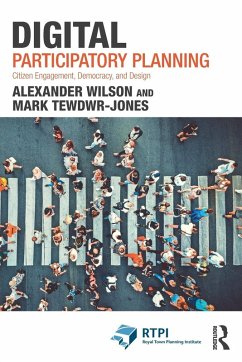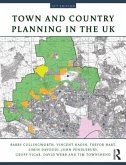Digital Participatory Planning outlines developments in the field of digital planning and designs and trials a range of technologies, from the use of apps and digital gaming through to social media, to examine how accessible and effective these new methods are. It critically discusses urban planning, democracy, and computing technology literature, and sets out case studies on design and deployment. It assesses whether digital technology offers an opportunity for the public to engage with urban change, to enhance public understanding and the quality of citizen participation, and to improve the proactive possibilities of urban planning more generally. The authors present an exciting alternative story of citizen engagement in urban planning through the reimagination of participation that will be of interest to students, researchers, and professionals engaged with a digital future for people and planning.
"Digital Participatory Planning is an excellent summary of where we are today and how participation in planning has developed, especially the use of digital technologies both formal and informal. This book stands out as a reference book accessible to practitioners as well as students. Given the growing interest in consultation and participation through digital and social technologies, it will be of interest to architects, developers, and policy makers alike." Rachel Cooper OBE, Distinguished Professor of Design Management and Policy, Lancaster University, UK
"Digital Participatory Planning focuses on the role technology can play in supporting effective planning. While the actual technologies, platforms and systems discussed will evolve and new technologies will come into play, the important contribution this book makes is to shine a light on to these emerging methods and processes. The book will be an important resource for those who practice urban, regional, and spatial planning, but also those involved in any forms of 'planning' that require public engagement, including large scale infrastructure projects." Richard Kingston, University of Manchester, UK
"Digital Participatory Planning is at the forefront of debate in the discipline. This is particularly so in the UK where current proposals could see the entire English planning system move consultation online. Yet, the authors are correct that this is a little understood debate, and much literature on this subject currently focuses on 'efficiencies' in a rather clinical way, rather than the spaces and places in which normal people live. This book addresses the gap in this thinking, and it is much needed." Alexander Nurse, University of Liverpool, UK
"Digital Participatory Planning focuses on the role technology can play in supporting effective planning. While the actual technologies, platforms and systems discussed will evolve and new technologies will come into play, the important contribution this book makes is to shine a light on to these emerging methods and processes. The book will be an important resource for those who practice urban, regional, and spatial planning, but also those involved in any forms of 'planning' that require public engagement, including large scale infrastructure projects." Richard Kingston, University of Manchester, UK
"Digital Participatory Planning is at the forefront of debate in the discipline. This is particularly so in the UK where current proposals could see the entire English planning system move consultation online. Yet, the authors are correct that this is a little understood debate, and much literature on this subject currently focuses on 'efficiencies' in a rather clinical way, rather than the spaces and places in which normal people live. This book addresses the gap in this thinking, and it is much needed." Alexander Nurse, University of Liverpool, UK
"Digital Participatory Planning is an excellent summary of where we are today and how participation in planning has developed, especially the use of digital technologies both formal and informal. This book stands out as a reference book accessible to practitioners as well as students. Given the growing interest in consultation and participation through digital and social technologies, it will be of interest to architects, developers, and policy makers alike." Rachel Cooper OBE, Distinguished Professor of Design Management and Policy, Lancaster University, UK
"Digital Participatory Planning focuses on the role technology can play in supporting effective planning. While the actual technologies, platforms and systems discussed will evolve and new technologies will come into play, the important contribution this book makes is to shine a light on to these emerging methods and processes. The book will be an important resource for those who practice urban, regional, and spatial planning, but also those involved in any forms of 'planning' that require public engagement, including large scale infrastructure projects." Richard Kingston, University of Manchester, UK
"Digital Participatory Planning is at the forefront of debate in the discipline. This is particularly so in the UK where current proposals could see the entire English planning system move consultation online. Yet, the authors are correct that this is a little understood debate, and much literature on this subject currently focuses on 'efficiencies' in a rather clinical way, rather than the spaces and places in which normal people live. This book addresses the gap in this thinking, and it is much needed." Alexander Nurse, University of Liverpool, UK
"Digital Participatory Planning focuses on the role technology can play in supporting effective planning. While the actual technologies, platforms and systems discussed will evolve and new technologies will come into play, the important contribution this book makes is to shine a light on to these emerging methods and processes. The book will be an important resource for those who practice urban, regional, and spatial planning, but also those involved in any forms of 'planning' that require public engagement, including large scale infrastructure projects." Richard Kingston, University of Manchester, UK
"Digital Participatory Planning is at the forefront of debate in the discipline. This is particularly so in the UK where current proposals could see the entire English planning system move consultation online. Yet, the authors are correct that this is a little understood debate, and much literature on this subject currently focuses on 'efficiencies' in a rather clinical way, rather than the spaces and places in which normal people live. This book addresses the gap in this thinking, and it is much needed." Alexander Nurse, University of Liverpool, UK








